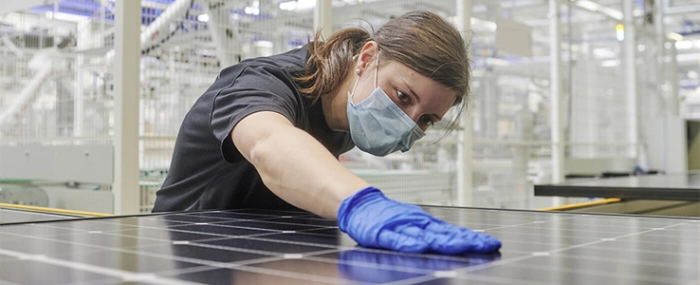
© Meyer Burger
Business |
Meyer Burger secures €185 million to expand cell capacity
The Meyer Burger group closes a syndicated loan agreement for EUR 125 million and a factoring agreement for EUR 60 million. The debt financing of EUR 185 million serves to expand the annual production capacity to reach 1.4 GW of solar cells in Thalheim (Bitterfeld-Wolfen), Germany and 1 GW of modules in Freiberg, Germany.
Meyer Burger is no longer planning to sell solar cells to third parties but will instead process all solar cells from its own production into modules. A second module factory is planned to start operations in 2022 with an initial capacity of 0.4 GW, balancing cell and module capacity.
The loan agreement for EUR 125 million with a syndicate led by Ostsächsische Sparkasse Dresden, Germany was signed on June 15, 2021. Further lenders include a group of savings, development and cooperative banks. The loan, which matures on June 30, 2027, is to be used to finance investments to expand production capacity at the Bitterfeld-Wolfen (Saxony-Anhalt, Germany) and Freiberg (Saxony, Germany) production sites. Eighty percent of the loan volume is guaranteed by the Federal Republic of Germany and by the federal states of Saxony and Saxony-Anhalt. The disbursement conditions of the syndicated loan agreement require Meyer Burger to raise additional financing in the amount of EUR 100 million by June 2022. The factoring agreement for EUR 60 million with a German specialist bank for working capital finance has a term until June 30, 2024. Both credit facilities were concluded at standard market conditions, including customary financial covenants.
Meyer Burger has previously communicated its plan to raise CHF 180 million in debt financing by 2022 to further expand its production capacity to 1.4 GW of cells and 0.8 GW of modules. With the new financing package, the Board of Directors of Meyer Burger Technology Ltd intends to accelerate the expansion with 1.4 GW of cell and module production capacity already by the end of 2022, thereby closing the gap between module and cell capacity.
The intention is to achieve an annual module production capacity of 1 GW in Freiberg, Germany and initially 0.4 GW at a second module fab location by the end of 2022. As part of the revised strategy, the Board of Directors has decided not to sell its HJT solar cells to third parties as previously planned, but to process the entire cell production into modules itself.
Chairman of the Board of Directors Franz Richter commented: "Meyer Burger can now focus entirely on the higher-margin module business. At the same time, the financing package enables us to expand our business faster."
A selection process for the second module production site is ongoing. The company intends to design the second module plant for producing utility modules but with the flexibility to also produce rooftop modules in line with market demand. Meyer Burger plans to introduce utility products (glass-foil modules and bifacial glass-glass modules) with up to 570 W module power and up to 22.9% efficiency in 2022.
By 2026, the company plans to increase both cell and module production capacity to 5 GW each and to reach 7 GW each by 2027. This will also require the establishment of further manufacturing sites, a press release states.
CEO Gunter Erfurt added: "Now, we can drive the capacity expansion for our high-performance cells and modules at full speed. The extensive due diligence by the bank consortium and their independent advisors validates our business case and the growth plan."

